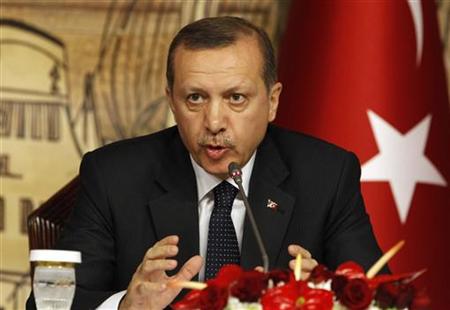(Reuters) – Turkish Prime Minister Tayyip Erdogan ruled out a general amnesty for Kurdish militants on Sunday but said intelligence agents would continue to talk to the rebels’ jailed leader in a bid to end a near three-decade insurgency.
Erdogan’s chief adviser said last week that Turkish officials had been discussing disarmament with the Kurdistan Workers Party (PKK) and on Thursday two Kurdish lawmakers paid a rare visit to the militant group’s leader in his island prison.
Although Turkish authorities have held talks in the past with the PKK, the negotiations were secretive and largely appeared to have run aground. The open acknowledgment of the latest contact has raised hopes of a renewed peace effort.
Erdogan said Turkey was taking a two-pronged approach, with the state intelligence agency talking to PKK leader Abdullah Ocalan, imprisoned on the island of Imrali since his capture in 1999, and the government talking to Kurdish politicians.
“Talks with Ocalan is not a new process … I have said before that we will negotiate with (Kurdish) politicians and struggle against terrorism,” Erdogan told reporters before leaving for an official visit to West Africa.
He ruled out an amnesty for PKK fighters or the possibility of Ocalan being released from Imrali and placed under house arrest. Better conditions for Ocalan are one of his supporters’ main demands.
“General amnesty for those who have been involved in terrorist activities is out of the question. House confinement for (Ocalan) is also out of the question,” Erdogan said.
MOUNTING PRESSURE
Talks with the PKK, which is designated a terrorist group by Turkey, the United States and the European Union, would have been unpalatable to Turkish public opinion only a few years ago.
Ocalan, who founded the group in 1974 to fight for an independent Kurdish state in Turkey’s southeast, is widely reviled by Turks who hold him responsible for the deaths of more than 40,000 people since the PKK took up arms in 1984.
Erdogan is under pressure to stem the violence, which has included bomb attacks in major cities as well as fighting in the southeast, particularly with presidential elections due in 2014 in which he is expected to stand.
Last summer saw some of the conflict’s bloodiest violence and the war in neighboring Syria has heightened tensions, with Ankara accusing Syrian President Bashar al-Assad of arming the PKK.
The PKK stages attacks on Turkish territory partly from bases in the remote Kandil mountains in northern Iraqi Kurdistan, which has been autonomous from Baghdad since 1991 and has its own armed forces.
Turkey has forged closer ties with Iraqi Kurdistan and is a major trading partner for the region, but Kurdish President Masoud Barzani has repeatedly condemned Turkish military operations against the PKK in Iraq and says Turkey’s Kurdish problem can only be solved peacefully.
Barzani welcomed the latest talks between the Turkish state and the PKK, describing them as a “big, positive step”.
“His excellency hopes this will be a serious and effective start to sowing permanent peace,” a spokesman for Barzani said in a statement on the regional government’s website.
(Additional reporting by Isabel Coles in Arbil; Writing by Nick Tattersall; Editing by Pravin Char)

COMMENTS
Please let us know if you're having issues with commenting.